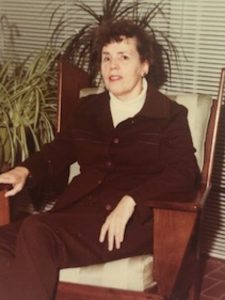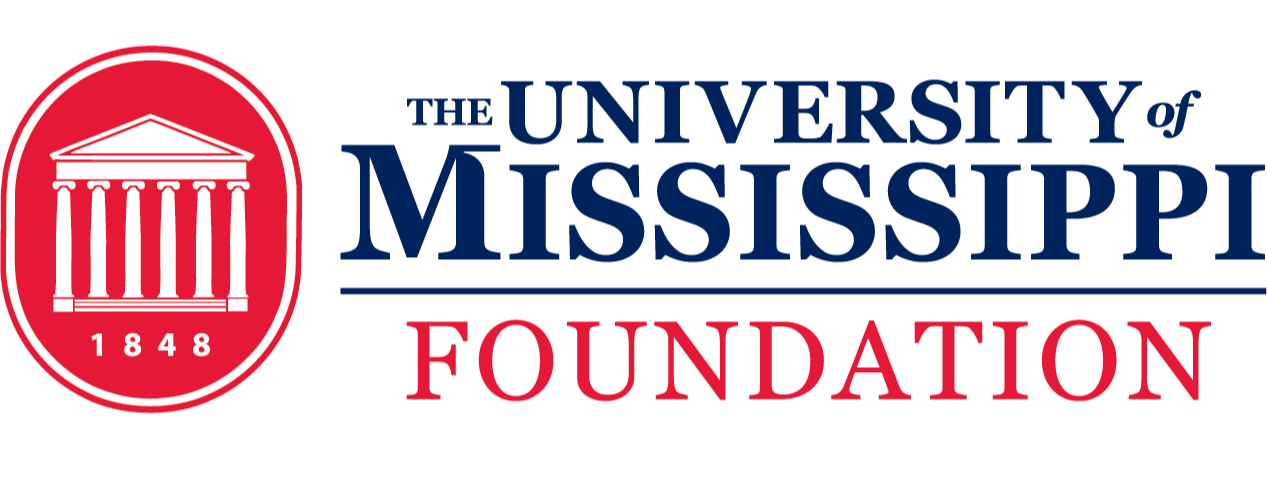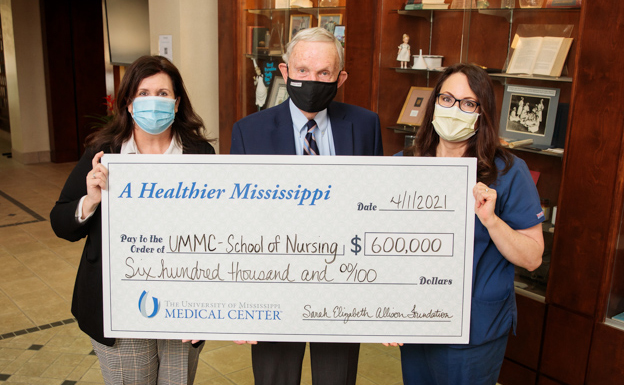
Helping nurses develop resilience during stressful times is the focus of a $600,000 gift from the Sarah Elizabeth Allison Foundation to the School of Nursing at the University of Mississippi Medical Center.
The gift will create the Sarah E. Allison Research Lab for Self-Care and Wellness, which will promote instruction in how self-care can fight burnout among Mississippi’s nurses and how nurses can teach their patients these resilience-building skills.
“Dr. Allison had a real heart for Mississippi,” said Dr. James Hughes, who was a friend and colleague of her and is a member of the Allison Foundation board. “She may have been Baltimore by birth, but she had a warm spot in her heart for this state and for supporting leadership in the nursing arena. Her first love was providing nursing leadership.”
Hughes’ daughter Kathryn Long, a registered nurse and diabetes care and education specialist at UMMC and a member of the foundation board, agreed.
“Dr. Allison’s desire would be to support nurses’ resilience and their continuing education,” Long said. “This will give nurses the skills they need to manage the stress and anxiety that can occur in this profession.”
Burnout can be a danger to nurses’ health and can affect the care they provide. The Joint Commission, which accredits and certifies more than 22,000 health care organizations and programs in the U.S., reported that, out of 2,000 respondents to a national nursing survey in April 2019, more than 15 percent reported feelings of burnout.
A 2017 study published by the National Center for Biotechnology Information notes that the symptoms of burnout, which can include insomnia, headaches, fatigue and depression, not only harm nurses’ health but can increase turnover rates in the profession and affect the quality of patient care.
Hospital stays can be stressful for patients as well as caregivers, multiple studies note, highlighting the link between self-care and health.
When representatives of the Allison Foundation and School of Nursing leaders began planning the gift and considering its future impact, the COVID-19 pandemic had not yet occurred, said Dr. Julie Sanford, dean of the School of Nursing.
“This has been such a scary time, and our nurses have been under a tremendous amount of stress,” Sanford said. “We are so grateful to the Allison Foundation for this gift and look forward to the difference this will make for nursing students and nursing faculty, who can access this resource for self-care research.”
Hughes, who had chaired orthopaedics at UMMC, met Allison when she was his patient in the early 1970s after a serious car accident in Maryland left her with multiple broken bones.
Professional respect grew into a friendship among Allison, Hughes and his family.
“I knew her as Aunt Betty or Miss Betty,” Long remembered. “She was a Renaissance woman who loved her patients and her profession, but also literature, travel, opera and theater, and she had the most brilliant mind. She’s one of the reasons I went into nursing.”
Allison earned her nursing diploma and Bachelor of Science degree in nursing from Johns Hopkins University in 1953 and 1959, respectively. She earned a Master of Science degree in nursing from Catholic University in Washington, D.C., in 1963 and a doctorate in education from Columbia University in 1968.
After serving as director of clinical nursing at Johns Hopkins Hospital, she followed the Hughes family to Mississippi, serving as nursing administrator at Methodist Rehabilitation Center from 1976 to 1990.
Described by Hughes and Long as a “stellar nurse,” Allison was a contemporary of Dorothea Orem, whose Self-Care Deficit Theory of Nursing is one of the cornerstones of nursing education.
“She employed the Self-Care Deficit Theory at Methodist Rehabilitation Center,” Long said.
The Self-Care Deficit Theory, also known as the Orem Model of Nursing, holds that all patients want to care for themselves and will recover from illness or injury more quickly if allowed to perform their own self-care as they are able. It is among the nursing theories taught by UMMC’s nursing faculty.
Allison established the foundation in 2000 to promote and support the continuing development of the nursing profession and Orem’s theories. Allison stayed in Jackson after retirement. The Maryland native died at 91 in her home June 29, 2017.
Sanford said the lab and the instruction that will be provided to nursing students there is a fitting memorial to Allison.
“Her legacy will be in the training of nursing students at UMMC,” Sanford said, “and the care they provide. By learning how to be more resilient during stressful times, nurses will be able to provide better care and show their patients self-care techniques that can help in their recovery.”
To support the University of Mississippi Medical Center, visit http://www.umc.edu/givenow/ or contact Meredith Aldridge, executive director of development, at 601-815-7469 or mmaldridge@umc.edu.
By Annie Oeth/UMMC Public Affairs

